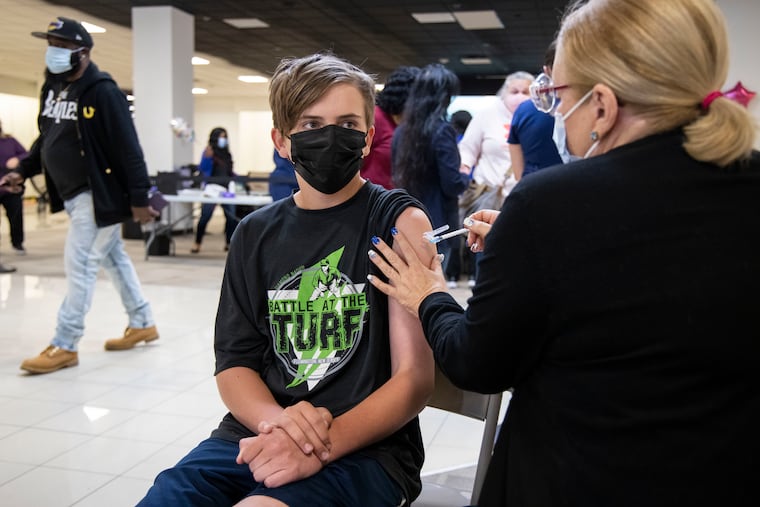A Philly pediatrician on parents’ top fears on the COVID-19 vaccine | Expert Opinion
Since children 12 and older became eligible for the Pfizer vaccine, I have been hearing a plethora of fears from parents. Here are six common concerns and how I address them.

On May 12, the American Academy of Pediatrics (AAP) updated its guidance to recommend vaccinating all children ages 12 and older against COVID-19. As a pediatrician, I could not be more thrilled!
As more Americans are becoming eligible for the COVID-19 vaccine, vaccination rates, which were initially on the rise, have recently been plummeting. Public health experts are worried that “vaccine hesitancy” is to blame. Pediatricians are very familiar with vaccine hesitancy. Most of the time, parents who are reluctant to vaccinate their kids with all of the standard childhood immunizations really just want some reassurance from the pediatrician that the vaccines are safe and effective.
Since children 12 and older became eligible for the Pfizer vaccine, I have been hearing a plethora of fears from parents. Here are six common questions and how I address them.
1. Do COVID-19 vaccines affect fertility?
Absolutely not. Ongoing surveillance by the three vaccine makers have failed to reveal negative effects impacting fertility in men or women. There doesn’t appear to be any way reproductive functions would be damaged by any one of the three approved vaccines. In fact, although pregnant women were not included in initial clinical trials, a few dozen women who participated in the Pfizer and Moderna trials became pregnant. They continued in the trials with no safety problems.
2. Are the COVID-19 vaccines safe for children?
Safety is one of the biggest worries among parents. The Pfizer vaccine was studied in more than 2,200 participants ages 12 and 15, roughly half of whom received two doses. The other half received a placebo. The side effects experienced by the children in the trials were similar to adults: pain at the injection site, fever, chills, and headache. Millions of teens in the U.S. have already gotten the Pfizer shot with no red flags.
3. Since kids don’t get very sick with COVID-19, why vaccinate them?
Children can become infected with the coronavirus — and more than 3.85 million have tested positive in the United States since the start of the pandemic. Since the pandemic began, nearly 500 kids age 17 and younger have died from COVID-19 in the U.S. And although children generally experience less severe symptoms than adults, that’s not always the case. Some kids have developed multisystem inflammatory in children, or MIS-C, a rare but serious inflammatory condition. Researchers are also studying a relatively small but growing number of children who are experiencing symptoms of long-haul COVID.
4. Could the COVID-19 vaccine alter my child’s DNA?
The Pfizer vaccine uses messenger RNA, or mRNA, technology that teaches the body’s cells to make a harmless piece of the so-called “spike protein” on the SARS-CoV-2 virus, triggering an immune response that produces antibodies. It does not interact with a person’s DNA; parents should not worry that mRNA vaccines will change their child’s DNA.
5. Do the COVID-19 vaccines work as well on kids as on adults?
In clinical trials , Pfizer’s shot had 100% efficacy in participants ages 12 to 15. Eighteen cases of COVID-19 were observed in the placebo group vs. none in the vaccinated group. The vaccinated kids had a robust antibody response, even exceeding those reported in older age groups. More antibodies means a better immune response.
6. My kids already had COVID-19. Why do they need to get vaccinated?
We don’t yet know how long antibodies will remain in the body to protect you from the virus and because it is (rare but) possible to get infected again, it’s important to get vaccinated. Additionally, early research has shown the vaccines provide even stronger immunity than natural infection.
When the time comes for your child to get vaccinated, remember to speak to your pediatrician, before searching for answers on social media, about any concerns you might have. Remember, children have a crucial role in inching the U.S. closer to the goal of herd immunity (or at least a return to normality). Getting Americans vaccinated as quickly as possible is important in preventing more variants from developing and spreading.
Khushbu Shah is an emergency room pediatrician at St. Christopher’s Hospital for Children and an urgent care pediatrician at PM Pediatrics. Follow her on instagram @doctorkhushi.